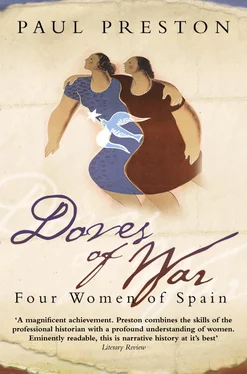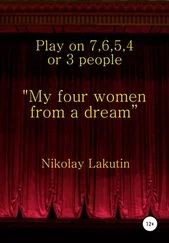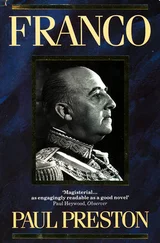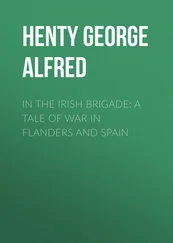A letter from Princess Bea expressing her anxiety that Franco might join the war alongside Hitler left Pip wondering if Ataúlfo would end up dropping bombs on London. The mid-September visit to Berlin of Franco’s brother-in-law, Ramón Serrano Suñer, was assumed to herald Spanish belligerence. Her analysis of the strategic consequences if Spain went to war, in terms of the loss of Gibraltar and the closing of the Straits, was extremely acute. Her rhetorical question as to why Britain did not try to keep Spain neutral by offering to return Gibraltar after the war exactly echoed Churchill’s own thinking. Her personal anguish at the implications of Spain at war with Britain could hardly have been more intense.
I can’t imagine a greater hell than knowing that Ataúlfo is fighting against me and is bombing day after day. He will never live through a whole other war. It just isn’t possible. And I shan’t even know if he is alive or not. I can’t fight against a country I have fought with for two years, and I would rather die than fight against Ataúlfo. But still women don’t fight and anyhow it is no good feeling that way because we have to win this war and if all the people I love best have to be my enemies meanwhile I will just have to put up with it … For a year I have been miserable because I can’t go back to Spain or see Ataúlfo, but at least I was happy to know that he was safe and enjoying himself and now even that consolation looks like being taken away. 146
In the midst of her distress, she received an insouciant letter from Consuelo asking ‘is London as destroyed as they say? What a shame, such a nice town, it is a great pity.’ A philosophic Pip pondered, ‘how very far we are from our fellow human beings, even great friends. It is funny to think how I worry about Spain joining in this war and how little they worry about us. And we are supposed to be the unfeeling, unemotional ones.’ However, news of Franco’s historic meeting with Hitler at Hendaye on 23 October 1940 renewed all of her anxieties. On that day, she had a terrifying attack of depression, – ‘all of a sudden I began to feel utterly lonely and futile and within about two minutes was lying on the floor sobbing my heart out at the misery and beastliness of life … I felt imprisoned by an impenetrable barrier of wickedness and pettiness and knew that I should never get out. I just lay in the middle of a circle of evil, wicked, mean things sobbing and exhausted with despair.’ No doubt this was a delayed reaction to the terror that she was experiencing during the night-time bombing attacks. And further considerable anxiety was provoked by the fact that Franco, in whose cause she had given so much, was toadying up to Hitler, who was in the process of destroying London. 147
Her reaction to another letter from Consuelo revealed a Pip who was growing up fast. Consuelo wrote that Ataúlfo was behaving very badly, was constantly drunk and deliberately provoking rows with his mother and father. He had told her that ‘he did not care a damn any longer about pleasing his parents as they had ruined his life by not letting him marry the person he wanted to’. Pip’s reaction was extraordinarily mature and wise. ‘What a fat head he is. Too weak to defy his parents in anything important so he just drives them crazy in small ways and no doubt makes himself miserable in the attempt.’ Her romantic longings of old seemed to be replaced, consciously at least, by sadness that Ataúlfo was squandering his talents. Some days later, she awoke in tears after a dream about him: ‘We were in a crowd of panic-stricken women and swarms of babies. He kept trying to reach me and getting swept away. I was terrified of something. At last he reached me and just as he stretched out his hand to catch mine I woke up simultaneously as he was swept away right out of sight.’ 148
That Pip’s heart remained in Spain was revealed when Juan Antonio Ansaldo made a visit to London prior to taking up his duties as Air Attaché. When she was invited to have a drink with him and some friends, she assumed that they would have forgotten all about her ‘the same as all my friends here did while I was in Spain’. ‘The only reason they were ever so friendly was because they thought I was engaged to Ataúlfo, but by now they will have forgotten that and I am just another dim English girl who once went to Spain … Now maybe I will wake up to the fact that I don’t belong in Spain and no one there cares two damns about me any longer outside of Sanlúcar.’ Her anxieties were totally misplaced. When they met at the Dorchester, Ansaldo fell upon her effusively. She was so moved by his affectionate response to her that she wrote later: ‘It was a feeling like coming home again after a long exile. I felt as if someone had removed a ton weight off me. Despite all my longing for Spain, I had not realised till then just how much I loved it.’ Her delight at being able to reminisce in Spanish was short-lived. As dawn was breaking on her way home from an extremely alcoholic dinner, she witnessed rescue squads trying to retrieve people trapped in the cellars of bombed houses. When she saw her Spanish friends again on the eve of their return to Madrid, she wept uncontrollably. ‘I know this is my country but it does not feel like it. I feel like an exile from home and I can’t go back. 149
Nostalgia for Spain made it all the more difficult for Pip to throw herself into her Polish project. Having got embroiled in it so as not to be tempted to run back to Spain, she was now regretting the decision. She even began to wonder if she should not have accepted one of the several offers that she had had to go to Spain to work for British Intelligence. The visit of Ansaldo had left her feeling that her love for Spain was not just about Ataúlfo. ‘I love that country and anything to do with it.’ 150 Nevertheless, she put aside her distress and knuckled down to making a success of the Polish Hospital. In late October and early November 1940, all the preparatory work began to come together. Pip forged an alliance with Diana Napier, a minor film star and wife of the great Austrian tenor, Richard Tauber, who was in charge of organising ambulances for the Polish Army. A base was found at Dupplin Castle, between Perth and Dundee on the Firth of Tay. At first, Pip faced considerable difficulties in getting the hospital up and running: ‘More and more I hate this Hospital and all the Poles … Loathe the Poles, loathe the Hospital and want to be back in Spain. Even without Spain I should still loathe the Poles.’ Inevitably, as always happened, the more she threw herself into her work, the more engrossed and therefore the less unhappy she became. 151 The hospital was called SEFA – from the initials of Scott-Ellis, Marjorie Fielden and Dorothy Annesley.
There were occasional flashes of news from Ataúlfo, mainly when he was in Madrid, which convinced Pip that he was frightened of showing his feelings for her when he was at his parents’ home. At the end of November, a brief stay in London was prolonged after a car crash in the blackout. She was recovering from minor facial surgery when she was visited by Peter Kemp. Her old comrade from the Nationalist ranks told her that he had seen Ataúlfo in Madrid just after he had received news of her flight from France. Pip was amused to be told that he had been furious to hear of her French adventure. He had said that he wished that she had been taken prisoner so that his family could have arranged for the Germans to send her to Spain. She was even more delighted to hear that while in Madrid liaising with the German military representatives, Ataúlfo had ‘received a delegation from all the brothels of Madrid to ask him to ask the Germans to take their boots off!’ 152
In December 1940, Pip was given the title of honorary colonel in the Polish Army. She found it ‘rather fun’ being called ‘ Pani Pulkownik ’ (Madame Colonel). Life settled down into a monotonous routine. Pip worked immensely hard and learned a lot of physiology and anatomy. 153 Her Polish became as fluent as her Spanish. Beyond her work, her main preoccupation regarding the outside world was that Spain did not enter the war on Hitler’s side. She was as distressed as many of her Polish comrades by the idea of alliance with Soviet Russia. Her class prejudices, and her experiences in Spain, shone through in her remark that ‘I should hate to fight with a lot of bloody Communists almost as much, though not quite, as I should hate to fight against Spain.’ 154
Читать дальше












